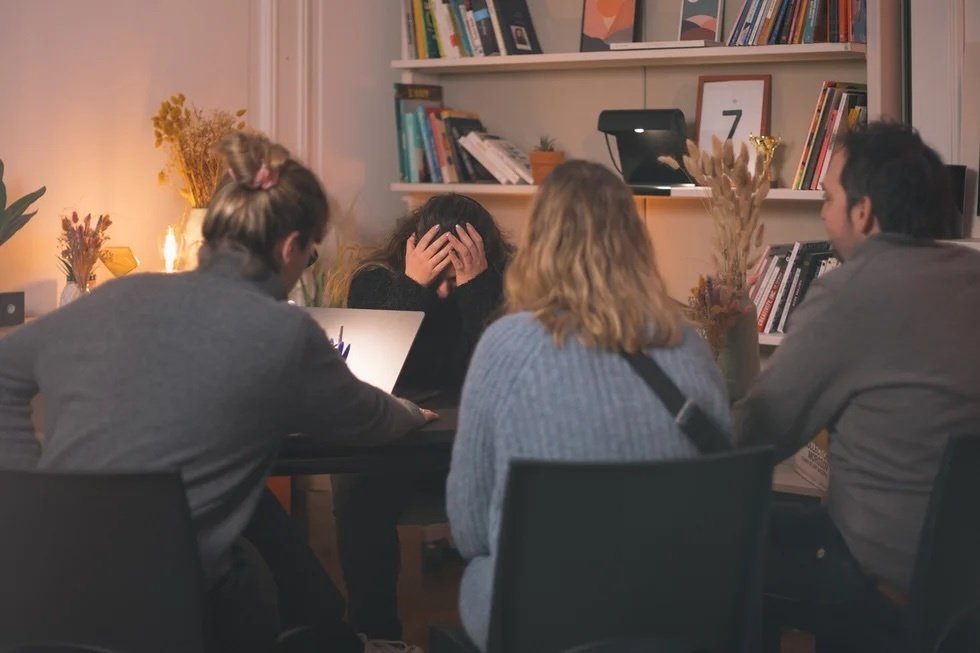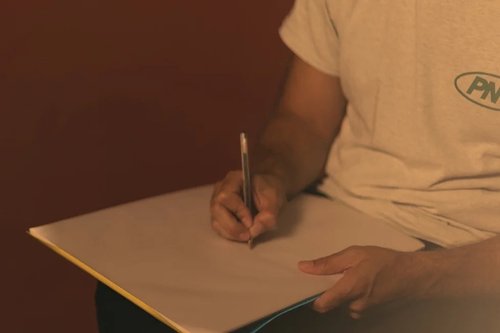Interview anxiety: Don’t let your nerves get the best of you!
05 févr. 2024
5min


Freelance journalist and writer
It might not come as a surprise that 73% of job seekers feel stressed during job-hunting. The process itself can be a bit nerve-wracking for all of us, especially if we’re pursuing a strongly-desired position. However, a recent study uncovered a notable statistic—92% of candidates experience anxiety both before and during job interviews.
This begs the question: why is interview anxiety so prevalent? And if almost all candidates go through this, what steps can be taken to minimize or even eliminate it? To shed light on these concerns, recruiter, career coach, and content creator Cleo Rualo.
Spotting interview anxiety
Interview anxiety is a common experience that many of us have likely encountered at least once and is usually characterized by nervousness, anxiousness, or panic before or during a job interview. “Numerous factors contribute to such feelings of anxiety and stress because the job search journey is inherently uncertain, with job seekers navigating through numerous unknowns,” says Rualo.
These feelings can originate from uncertainty, self-doubt, fear of not measuring up, or the belief that one is unprepared. But it can also come from a good place, driven by a genuine concern for the interview and a desire to perform well.
How interview anxiety manifests itself varies from person to person. Symptoms can be both mental and physical, for example:
- racing thoughts,
- nervousness,
- negative self-talk,
- increased heart rate,
- stumbling over words while responding to questions.
These are things no one wishes to encounter during an interview. So, what steps can be taken to minimize the likelihood of experiencing them?
It all starts with prep
Work on your interview anxiety begins as early as in the first stage of the interview process: the preparations. “When candidates are well-prepared, they tend to feel more confident and in control, reducing anxiety,” explains Rualo. It’s as simple as that!
Start by gaining as much knowledge prior to the interview as you can. Research the company, gather information about the interviewers, and inform yourself about the current state of the industry or field you’re applying for. “This will allow you to exert control over additional factors, including your emotions, self-perception, and the way you present yourself—and significantly alleviate anxiety as a result,” Rualo shares.
Rualo advocates one of the most effective techniques for combating interview anxiety is engaging in mock interviews. “I’ve noticed a significant transformation in the way my clients think and feel from the beginning to the end of these mock interview sessions.”
You can do it either on your own in front of the mirror or with someone you can trust will be capable of providing honest feedback, be it your work bestie, your sibling, your good friend, etc. Make sure to cover every aspect of a job interview—your presentation, technical, situational, and behavioral questions, as well as body language—and always ask for extensive feedback.
As part of the preparation process, you can also consider a dress rehearsal where you plan what you’re going to wear for the interview and assess how you feel about it. Feeling good about your appearance and what you’re wearing can significantly impact your self-perception when interacting with others—and dealing with interview anxiety involves making yourself comfortable and confident every step of the way.
Facing your nerves
Interviews are an integral part of the job-seeking process and serve as a platform to discuss your qualifications, background, and skills with an interviewer or hiring manager. If you think about it, it’s just a conversation with someone from the company who’s already interested in you!
Still, feeling a bit nervous before job interviews, especially when you’re keen on securing a particular position, is entirely normal. But for those grappling with interview anxiety, Rualo offers a couple of valuable tips on how to alleviate it and make the interview process more manageable so that you can present yourself in the best possible light.
Tip 1: Focus on the present moment
Feeling anxious often directs your attention inward, generating negative thoughts. You can try to combat this by focusing on the present situation. “Shift your anxious mindset to engaging with the interviewer and showing genuine interest in the discussion,” says Rualo. Get to know the interviewer more, follow up on different discussion points, etc. This will not only help control your thoughts but also make you seem like a motivated and proactive candidate.
Tip 2: Take your time
Remember that you don’t need to respond swiftly to every question—it’s a discussion, not a race! Before answering, take a breath and use a few seconds to organize your thoughts. You can even buy yourself more time by saying, “This is a really good question! Let me think about that for a second.”
Tip 3: Ask clarifying questions
Asking questions throughout the interview is an easy way to make you look more engaged in the discussion. But it can also be very beneficial to you, as a job interview is as much of a chance to decide if a company is right for you, as it is for the company to decide whether you’re a good fit. So don’t hesitate to ask about aspects that either haven’t been covered by the interviewer or you’d like to know more about, such as company policies, employee benefits, environmental initiatives, or overtime expectations.
Tip 4: Be kind to yourself and know your value
We’ve said it before and we’ll say it again: the fact that you were invited to the job interview is a great accomplishment already. It means that you sparked the organization’s interest and they want to get to know you. Keep reminding yourself of this, then acknowledge your strengths, experience, and the value you bring to the role. Rualo even recommends incorporating this positive self-talk into your regular routine. “It is so beneficial for both daily life, for building confidence, and for helping you stay yourself during the interview process.”
Tip 5: Don’t be scared to be honest
A big part of fostering a positive mindset involves actually acknowledging your interview anxiety. So many of us experience it, so it’s normal that you struggle with it at times too—and admitting it to yourself is the first step in using it as a motivator. “Remind yourself that you’re feeling this because you want to do well”, says Rualo. And if needed, don’t be afraid to admit your anxiety to the interviewer, asking for a moment to breathe and calm down. It will only humanize you and reflect your self-awareness—and after all, interviewers are people too.
Tip 6: Fight overthinking with feedback
While constructive self-reflection post-interview can be beneficial, there’s a potential challenge of candidates being overly critical due to anxiety. “This is very common, especially when a candidate is particularly anxious,” says Rualo.
To prevent this, she recommends contacting the interviewer shortly after the discussion to provide you with feedback. “Don’t hesitate to seek assistance when you need it! And be open to requesting feedback without fear,” says Rualo. “Ask for an honest review and to pinpoint specific areas for improvement.”
This could give you a valuable and more informed perspective on your performance—which, in turn, minimizes space for over-critical self-evaluation induced by post-interview stress.
You are not your anxiety
During high-stress periods like the job hunting process, anxiety can become our enemy, casting doubts on who we are and what we’re capable of. However, by preparing thoroughly, adopting a positive mindset, remaining open to learning, and presenting yourself authentically, you can actively minimize anxiety and enhance your performance to showcase your best abilities. You’ve got this!
Photo: Welcome to the Jungle
Follow Welcome to the Jungle on Facebook, LinkedIn, and Instagram, and subscribe to our newsletter to get our latest articles every week!

Inspirez-vous davantage sur : Se préparer à un entretien

Hybrid work goals: How to nail the negotiation in your next job interview
Want a hybrid work setup? Learn how to research, negotiate, and showcase the benefits of flexibility during your next job interview.
19 déc. 2024

The secret to interview success? That annoying colleague
Got a story about a difficult coworker? Good! That office drama might just be your ticket to acing your next interview.
16 déc. 2024

Is flexibility the key to “having it all” as a parent?
Balancing a career and parenthood can be challenging, but with the right approach, it’s possible to achieve both.
08 oct. 2024

Slacker vs. control freak: What’s your interview style?
We’ve all been there: whether you're overly anxious or effortlessly cool—what best describes you?
24 sept. 2024

Overcoming neurotypical norms during the job hunt
Neurodiverse individuals bring valuable innovation and should be more included in the workplace. How can we embrace their unique talents?
23 sept. 2024
La newsletter qui fait le taf
Envie de ne louper aucun de nos articles ? Une fois par semaine, des histoires, des jobs et des conseils dans votre boite mail.

Vous êtes à la recherche d’une nouvelle opportunité ?
Plus de 200 000 candidats ont trouvé un emploi sur Welcome to the Jungle.
Explorer les jobs